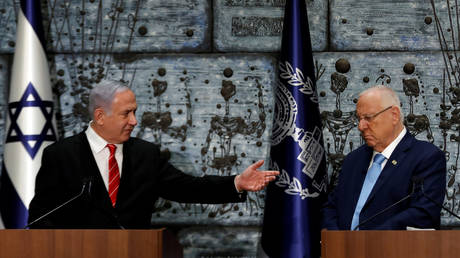
Israeli Prime Minister Benjamin Netanyahu has failed to secure a governing coalition despite weeks of negotiations after the March election, leaving President Reuven Rivlin to decide whether to pass the job to another candidate.
Netanyahu missed a midnight deadline on Wednesday to pull together a majority coalition in Israel’s 120-seat Knesset, following weeks of wrangling between his Likud party and smaller players. Rivlin, who has three days to consult with lawmakers to determine a path forward, could allow the PM an extra two weeks to ink a unity deal, though it remains unclear whether he will do so, as Netanyahu has failed to form a government three times over the last two years.
“Netanyahu informed the President’s Residence that he was unable to form a government and so returned the mandate to the president,” Rivlin’s office said in a statement, noting that the president would meet with party leaders on Wednesday morning.
Though Netanyahu could have requested an extension from the president ahead of the deadline, he instead issued a statement blasting the right-wing Yamina party leader Naftali Bennett, who’s flirted with joining forces with Yair Lapid’s center-left Yesh Atid party.
“Due to Bennett’s refusal to promise to only form a government with the right… the prime minister has returned the mandate to the president,” Netanyahu’s office said.
The latest round of political deadlock comes after the country held its fourth election in just two years back in March, with several of those races failing to produce a ruling majority. Though Netanyahu was able to reach an unusual power-sharing deal with Benny Gantz of the Blue and White party last year, seeing the pair agree to a rotating premiership, the shaky coalition collapsed after Gantz accused Likud of reneging on a budget plan that was part of the original unity deal. A fourth election soon followed.
Since the last race on March 23, in which Likud won 30 seats but failed to reach the 61-seat majority, Netanyahu has struggled to cobble together a coalition. Though he has approached some of his rivals with grand bargains, offering a power-sharing deal to Bennett, for example, all have rebuffed him.
Perhaps underscoring his desperation, the PM also reached out an Arab Islamist party, Raam, which currently holds four Knesset seats, but the gesture immediately stoked protests from the Religious Zionism Party, accusing Raam of supporting terrorism.
In a last-ditch effort to hold on to his post, Netanyahu endorsed a bill that would allow the Knesset itself to directly vote for a PM in a new snap election, though that project suffered a major setback on Tuesday night after Raam objected to the proposal, stalling it in committee.
Haaretz and the Times of Israel reported on Wednesday that Rivlin is expected to offer Lapid a chance to form a coalition. Haaretz cited a source saying that the president will choose Lapid even if Likud and other right-wing parties nominate Bennett as part of “a political game” aimed at boosting Netanyahu’s chances of staying PM into the next election.
Axios news website cited Rivlin’s aides saying that Lapid will most likely be given the mandate to form the coalition.
The power struggle comes at an extremely hard time for Netanyahu, who has been serving as PM for over a decade at this point. This week, a Jerusalem court continued to hear witnesses in the first of three corruption cases against the prime minister, in which Netanyahu is being accused of trading political favors with an owner of a media company in exchange for positive coverage. The PM vehemently denies any wrongdoing, but the allegations have dogged him for years, repeatedly sparking protests and counter-protests across the country.
Think your friends would be interested? Share this story!




